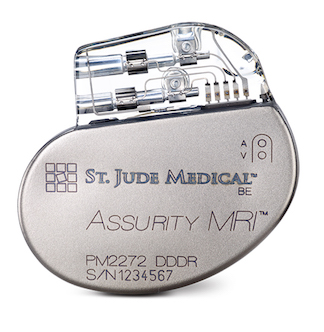St. Jude Medical Recalls 465,000 Pacemakers Over Security Vulnerabilities
Pacemaker Patients Must Visit Healthcare Provider for Firmware Update That Addresses Security Vulnerabilities
A
firmware update to address security vulnerabilities has been approved
and is now available for radio frequency (RF)-enabled St. Jude Medical
(now Abbott) implantable pacemakers, the U.S. Food and Drug
Administration (FDA) announced this week.
Vulnerabilities in St. Jude Medical's devices were made public
last year by MedSec and Muddy Waters, as investment strategy to short
sell shares of St. Jude's stock. The report claimed that attackers
could, among other things, crash implantable cardiac devices and drain
their battery at a fast rate.
 St. Jude rushed to refute the allegations and even sued the two companies, while University of Michigan researchers analyzed
the MedSec/Muddy Waters report and discovered that their
proof-of-concept (PoC) exploit did not actually crash the implanted
cardiac device.
St. Jude rushed to refute the allegations and even sued the two companies, while University of Michigan researchers analyzed
the MedSec/Muddy Waters report and discovered that their
proof-of-concept (PoC) exploit did not actually crash the implanted
cardiac device.
Muddy Waters and MedSec responded to the lawsuit
in October, after contracting security consulting firm Bishop Fox to
provide an expert opinion on St. Jude implantable cardiac devices. They
also revealed additional attacks against those devices.
FDA and the Department of Homeland Security (DHS) also launched an investigation into the matter. In December 2016, FDA released guidance
on the postmarket management of cybersecurity for medical devices,
while St. Jude Medical pushed a security update to resolve some of the
flaws in January 2017.
The
newly released software update was approved on August 23 and is now
available to “reduce the risk of patient harm due to potential
exploitation of cybersecurity vulnerabilities for certain Abbott
(formerly St. Jude Medical) pacemakers,” FDA announced.
The
firmware is intended for St. Jude Medical's implantable cardiac
pacemakers and cardiac resynchronization therapy pacemaker (CRT-P)
devices, including Accent, Anthem, Accent MRI, Accent ST, Assurity, and
Allure devices. Implantable cardiac defibrillators (ICDs) or cardiac
resynchronization ICDs (CRT-Ds) are not affected.
To install the update, patients must visit a healthcare provider, as the operation cannot be performed at home.
“The
FDA recommends that patients and their health care providers discuss
the risks and benefits of the cybersecurity vulnerabilities and the
associated firmware update designed to address such vulnerabilities at
their next regularly scheduled visit,” the FDA announced.
In an advisory,
US CERT reveals that three different vulnerabilities are addressed with
the new firmware update, all of which could be exploited via an
adjacent network. However, an attacker looking to leverage the flaws
needs to be in close proximity to the target pacemaker to allow RF
communications, the advisory reads.
The first of the bugs, CVE-2017-12712,
affects the pacemaker’s authentication algorithm, which can be
compromised or bypassed to allow a nearby attacker to issue unauthorized
commands to the pacemaker.
The second vulnerability, CVE-2017-12714,
resides in the pacemakers not restricting or limiting the number of
correctly formatted “RF wake-up” commands that can be received. Thus, a
nearby attacker could drain the device’s battery by repeatedly sending
commands.
Tracked as CVE-2017-12716,
the third issue affects Accent and Anthem pacemakers, which transmit
unencrypted patient information via RF communication, in addition to
storing optional patient information without encryption. The Assurity
and Allure pacemakers do not contain the vulnerability and also encrypt
stored patient information.
The
firmware releases meant to mitigate these issues include Accent/Anthem,
Version F0B.0E.7E; Accent MRI/Accent ST, Version F10.08.6C;
Assurity/Allure, Version F14.07.80; and Assurity MRI, Version F17.01.49.
“The
pacemaker firmware update will implement “RF wake-up” protections and
limit the commands that can be issued to pacemakers via RF
communications. Additionally the updated pacemaker firmware will prevent
unencrypted transmission of patient information (Accent and Anthem
only),” the CERT advisory reads.
The
firmware update can be applied to implanted pacemakers via the Merlin
PCS Programmer and the operation should be performed by a healthcare
provider.

Comments
Post a Comment